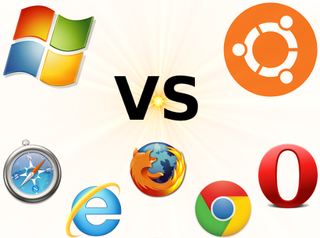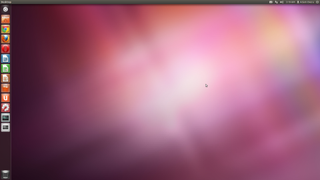Web Browser Grand Prix 9: Chrome 17, Firefox 10, And Ubuntu
Last month, we ran WBGP VIII on a MacBook Air, representing browser performance in a native Mac environment. Today we're returning to the PC. But the cross-platform comparison theme continues with a long-overdue rematch to WBGP 2: The Linux Circuit.

Web Browser Grand Prix 9: The Linux Circuit

I've been wanting to return to Linux in the Web Browser Grand Prix for a long time. You may not remember, but Web Browser Grand Prix 2: The Top 5, Tested And Ranked had a follow-up article: Web Browser Grand Prix 2: Running The Linux Circuit. As a Linux user myself, many of the results from the Windows-based Web Browser Grand Prix didn't apply to me personally. As we saw in the Mac OS X editions of the series, the same Web browser can perform very differently on other operating systems.
Today, we're running the Web Browser Grand Prix on Ubuntu 11.10 alongside Windows 7 Ultimate.

If you caught our recent review and cross-platform benchmarks of Ubuntu 11.10, you saw that Ubuntu won most of the tests, especially in segments where it simply cannot compete, like gaming. We received a lot of comments to the effect that Ubuntu is viable as an operating system for users who only require Internet access, light productivity, and casual gaming. Today we fill in the blanks on Ubuntu's Internet performance compared to Windows 7.
Recent News & Events
01/24/12: Opera updates from 11.60 to 11.61
01/31/12: Firefox 10 is released
02/08/12: Chrome 17 is released
02/09/12: Microsoft accidentally gives life to rumors of LG working on a ChromeOS device.
02/11/12: To date, Google has paid out over $410 000 in bounties for Chrome bugs.
02/12/12: Firefox updates from 10.0 to 10.0.1
02/14/12: Mozilla affirms it is creating a Windows 8 Metro interface for Firefox.
02/15/12: Chrome updates from 17.0.963.45 to 17.0.963.56
02/15/12: Having only taken the number two spot in Web browser market share from Firefox a few months ago, StatCounter predicts Google Chrome will overtake Internet Explorer to become number one by the end of March.
Now that we're all caught up, let's recount the previous Web Browser Grand Prix champions and get to know the five contenders.
Stay on the Cutting Edge
Join the experts who read Tom's Hardware for the inside track on enthusiast PC tech news — and have for over 25 years. We'll send breaking news and in-depth reviews of CPUs, GPUs, AI, maker hardware and more straight to your inbox.
Current page: Web Browser Grand Prix 9: The Linux Circuit
Next Page The Top 5: Chrome, Firefox, IE9, Opera, And Safari
Russian media claims server and storage supply has returned to pre-sanctions levels despite ongoing restrictions

Windows 11 will reportedly display a watermark if your PC does not support AI requirements

Asus creates motherboard specifically for overclocking Chinese CPUs — boosts homegrown KX-7000 clocks by 25%
-
mayankleoboy1 just wondering if use of a DX11 capable GPU will change scores in some HTML5 and other benchmarks as the browsers use DX11 assisted rendering.Reply
Also, AMD driver support in linux is poor compared to Nvidia.
For future Linux articles, can you use a Dx11 based Nvidia GPU? -
mayankleoboy1 IMO, Firefox is concentrating more on HTML5, ignoring CSS and JavaScript.Reply
It does well in HTML5 benches but 99% of the websites use primarily CSS and JS and HTML3, in which Firefox does poorly.
-
mayankleoboy1 Waiting for OPERA12. It keeps impressing me.Reply
Even without hardware acceleration, it keeps up with the competition,
When that beast launches, it will kill FF/IE and most probably chrome too. -
PreferLinux Who wants to guess that the poor Linux Flash and WebGL results were because Flash and WebGL don't use hardware acceleration with that graphics card and driver? I would be thinking so.Reply -
mitch074 Firefox performance took a dive starting with version 4, where all hardware acceleration was disabled: before then, in version 3.6, XRENDER was used when available (it was 4/5th as fast as IE9 on the same PC) while it is now really slow - it's all software.Reply
Moreover, the only driver enabled for hardware acceleration on Linux is the Nvidia driver: according to Mozilla (and verified by yours truly on AMD and Intel hardware), most display drivers in Linux suck when it comes to 2D rendering - ouch. Note that Mozilla and Google could add shims to circumvent those bugs, but they don't -not worth the effort, especially when driver makers could fix their bugs rather easily, leaving the browsers broken yet again. -
indian-art I use Chrome (19.0.1041.0 dev presently) the most on Linux (Ubuntu) and empirically I felt Chrome works very well. Now your tests confirm it.Reply
I find Opera 12 really nice too. It can run with Opera 11.61. Opera 12 has a silver icon & 11.61 has its classic red. I like Firefox & Epiphany too.
Its a shame Safari and IE are not truly cross-platform. -
mayankleoboy1 how many of those top 40 sites use HTML5?Reply
i think that the HTML5 scores should be weighed by a factor of the percent of top40 sites that use HTML5.
This way actual importance of HTML5 can be judged in real world. -
nd22 It's a shame Apple does not pay enough attention to the Windows market and optimize their browser! On Mac Safari is king of the hill - personal opinion of course!Reply
On Windows I feel that IE9 works really well for me, although Chrome is the speed demon! FF 4+ lost their appeal for me. -
forestie The OSes that are used are 64 bits but the browsers are mostly (all?) 32bits on Windows, and probably 64bits on Linux.Reply
Internet Explorer has 64bits builds on Win7, and Firefox has "almost" a 64bits browser on Windows too: Waterfox, which is a semi-official Firefox for 64bits Windows. Waterfox in particular claims huge improvements over base 32bits install, I would like to see how that translates into real-world.
Not sure about availability of 64bits editions of other browsers on Windows.
Here are my wishes:
-clearly mention if the 32bits or 64bits version of the browser is used
-where applicable and relevant, test with both 32bits and 64bits variants. I would like to see IE and FF split into 32 and 64 variants on Win for example.
I personally migrated from FF to WF on my machines 3 weeks ago and find it noticeably faster in everyday use. WF is now my main browser. -
doive1231 As long as phones keep using Android, Chrome will be the most popular browser for a long while. Google have got it all sorted.Reply
Most Popular

